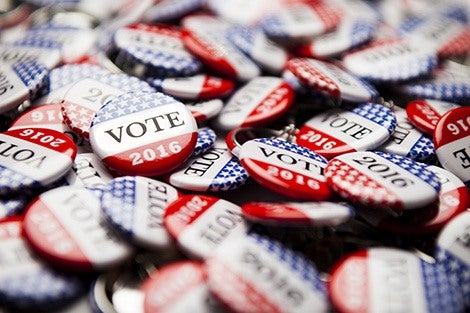For immediate release: Wednesday, June 7, 2017
Boston, MA – Stress, increased risk for disease, babies born too early, and premature death are among the negative health impacts that could occur in the wake of the 2016 U.S. presidential election, according to a new article from Harvard T.H. Chan School of Public Health and Massachusetts General Hospital/McLean Hospital.
Marginalized groups are likely to be most affected, the authors said. That’s because hostile attitudes toward racial and ethnic minorities, immigrants, and Muslims—which appear to have been brought more to the surface with the presidential candidacy of Donald Trump—have been linked in previous studies with both mental and physical adverse health effects.
The article appears in the June 8, 2017 issue of the New England Journal of Medicine (NEJM).
“Elections can matter for the health of children and adults in profound ways that are often unrecognized and unaddressed,” said David R. Williams, Florence Sprague Norman and Laura Smart Norman Professor of Public Health at Harvard Chan School and Professor of African and African American Studies at Harvard University, and lead author of the article.
Williams and co-author Morgan Medlock, a psychiatrist at Massachusetts General Hospital/McLean Hospital, explored a small but growing body of evidence on how election campaigns can influence health, and considered the implications for health care providers. They looked at existing studies that examined health impacts in the wake of the elections of former U.S. presidents, including President Donald Trump.
Studies conducted after President Obama was elected found an uptick in racial animosity among white Americans and a proliferation of hate websites and anti-Obama sentiment on social media. Donald Trump’s election appeared to heighten already hostile attitudes toward racial and ethnic minorities, immigrants, and Muslims, according to some early research.
Williams and Medlock cited a number of studies suggesting that such societal hostility can have serious health effects. For example:
• A January 2017 national survey by the American Psychological Association found that a large proportion of U.S. adults—more Democrats than Republicans, and more minorities than non-Hispanic whites—are stressed by the current political environment.
• An August 2016 University of California, Berkeley study of 1,836 U.S. counties found an elevated risk of death from heart disease among both black and white residents of high-prejudice counties, with a stronger effect among blacks than whites.
• A February 2006 University of Chicago study of birth outcomes among women of multiple racial and ethnic groups in California revealed that, in the six months after 9/11, when hostility against Arab Americans was intense, only among Arab American women was there a pattern of increased risk of low-birthweight babies or preterm births, as compared with the preceding six-month period.
The authors also warned that cuts to health and social services, such as the threatened repeal of the Affordable Care Act, are likely to further exacerbate the health challenges of poor and marginalized populations in the U.S. They reviewed studies that documented increases in infant mortality, preventable childhood diseases, and chronic disease among adults when such cuts were made early in the Reagan administration.
The authors suggested several ways that health care providers can respond if they find postelection “side effects” among their patients. For example, clinicians could directly address their patients’ emotional distress, suggesting psychotherapy or medication; clinicians and health care organizations could take a strong stance against hate crimes, discriminatory political rhetoric, and incivility; and the health care community can advocate for further research, or conduct their own, on potential negative health effects related to elections and the societal climate, as well as on identifying effective interventions to reduce their adverse effects on health.
Preparation of the article was supported by funding from the W.K. Kellogg Foundation and the Robert Wood Johnson Foundation.
“Health Effects of Dramatic Social Events – Ramifications of the Recent Presidential Election,” David R. Williams and Morgan Medlock, New England Journal of Medicine, June 8, 2017, doi: 10.1056/NEJMms1702111
For more information:
Todd Datz
tdatz@hsph.harvard.edu
617.432.8413
photo: iStockphoto.com
Visit the Harvard Chan School website for the latest news, press releases, and multimedia offerings.
###
Harvard T.H. Chan School of Public Health brings together dedicated experts from many disciplines to educate new generations of global health leaders and produce powerful ideas that improve the lives and health of people everywhere. As a community of leading scientists, educators, and students, we work together to take innovative ideas from the laboratory to people’s lives—not only making scientific breakthroughs, but also working to change individual behaviors, public policies, and health care practices. Each year, more than 400 faculty members at Harvard Chan School teach 1,000-plus full-time students from around the world and train thousands more through online and executive education courses. Founded in 1913 as the Harvard-MIT School of Health Officers, the School is recognized as America’s oldest professional training program in public health.
